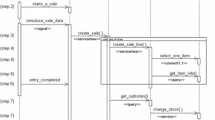Abstract
Most cost estimation models require a measure of the functional size of the application to be developed. To this end, FPA (Function Point Analysis) is one of the most used functional size measurement methods. FPA was originally proposed for traditional data processing systems, but it has been successfully adapted also to measure real-time and embedded systems. Since functional size measurement according to FPA can be quite expensive and time consuming, researchers have proposed “simplified” processes, which are expected to provide reasonably accurate measures, but require less effort and time. In this paper, we illustrate the application of these simplified techniques to UML models of software, via a precise mapping between UML elements and the so-called Basic Functional Components, upon which FPA measurement is based. As a result, it is possible to decrease the cost of modeling, and consequently the cost of measurement and estimation. The relatively low cost of the estimation models also allows developers to build different alternative models, to perform what-if analyses and choose the most economically sensible option.
Access this chapter
Tax calculation will be finalised at checkout
Purchases are for personal use only
Preview
Unable to display preview. Download preview PDF.
Similar content being viewed by others
References
Lavazza, L., Garavaglia, C.: Using Function Points to Measure and Estimate Real-Time and Embedded Software: Experiences and Guidelines. In: ESEM 2009, 3rd Int. Symp. on Empirical SW Engineering and Measurement, Lake Buena Vista, Florida, October 15-16 (2009)
Lavazza, L., Garavaglia, C.: Using Function Point in the Estimation of Real-Time Software: an Experience. In: Software Measurement European Forum – SMEF 2008, Milano, May 28-30 (2008)
Albrecht, A.J.: Measuring Application Development Productivity. In: Joint SHARE/GUIDE/IBM Application Development Symposium (1979)
International Function Point Users Group. Function Point Counting Practices Manual - Release 4.3.1 (2010)
ISO/IEC 20926: 2003, Software engineering – IFPUG 4.1 Unadjusted functional size measurement method – Counting Practices Manual, ISO, Geneva (2003)
Lavazza, L., del Bianco, V., Garavaglia, C.: Model-based Functional Size Measurement. In: ESEM 2008, 2nd International Symposium on Empirical Software Engineering and Measurement, Kaiserslautern, October 9-10 (2008)
Santillo, L., Conte, M., Meli, R.: Early & Quick function point: sizing more with less. In: 11th IEEE International Symposium on Software Metrics, Como, September 19-22 (2005)
ISO, Iec 24570: 2004, Software Engineering-NESMA Functional Size Measurement Method version 2.1 - Definitions and Counting Guidelines for the Application of Function Point Analysis. International Organization for Standardization, Geneva (2004)
COSMIC – Common Software Measurement International Consortium. The COSMIC Functional Size Measurement Method - version 3.0.1 Measurement Manual (The COSMIC Implementation Guide for ISO/IEC 19761: 2003) (May 2009)
Lavazza, L., del Bianco, V.: A Case Study in COSMIC Functional Size Measurement: the Rice Cooker Revisited. In: IWSM/Mensura 2009, Amsterdam, November 4-6 (2009)
Boehm, B.W.: Software Engineering Economics. Prentice-Hall (1981)
Boehm, B.W., Abts, C., Brown, A.W., Chulani, S., Clark, B.K., Horowitz, E., Madachy, R., Reifer, D.J., Steece, B.: Software Cost Estimation with COCOMO II. Prentice Hall Press (2009)
Lavazza, L., Robiolo, G.: The Role of the Measure of Functional Complexity in Effort Estimation. In: PROMISE 2010, the 6th International Conference on Predictive Models in Software Engineering, Timisoara, Romania, September 12-13 (2010)
Lavazza, L., Robiolo, G.: Introducing the Evaluation of Complexity in Functional Size Measurement: a UML-based Approach. In: 4th International Symposium on Empirical Software Engineering and Measurement – ESEM 2010, Bolzano, September 16-17 (2010)
Lavazza, L., Robiolo, G.: Functional Complexity Measurement: Proposals and Evaluations. In: ICSEA 2011 – the 6th Int. Conf. on Software Engineering Advances, Barcelona, October 23-29 (2011)
Oudshoorn, R.: Application of Functional Size Measurement on Requirements in UML, Ir.-degree Thesis, University of Twente (June 2005) (partly in Dutch)
van den Berg, K., Dekkers, T., Oudshoorn, R.: Functional size measurement applied to UML-based user requirements. In: Software Measurement European Forum - SMEF 2005, Rome, March 16-18 (2005)
Bévo, V., Lévesque, G., Abran, A.: Application de la méthode FFP à partir d’une spécification selon la notation UML: compte rendu des premiers essais d’application et questions. In: 9th Int. Workshop Software Measurement, Lac Supérieur, Canada (1999)
Fetcke, T., Abran, A., Nguyen, T.: Mapping the OO-Jacobsen Approach into Function Points. In: TOOLS 23 – Technology of Object Oriented Languages and Systems, Santa Barbara, July 28-August 1 (1997)
Forselius, L.: Faster and more accurate functional size measurement by KISS – keeping it simple. In: IFPUG FSS, Cambridge, MA, USA, March 28-29 (2006)
FISMA (Finnish Software Measurement Association). FiSMA FSM Method 1.1 (2004)
Zivkovic, A., Rozman, I., Hericko, M.: Automated software size estimation based on function points using UML models. Information and Software Technology 47(13) (2005)
Zivkovic, A., Hericko, M., Brumen, B., Beloglavec, S., Rozman, I.: The impact of details in the class diagram on software size estimation. Informatica 16(2) (2005)
Early & Quick Function Points for IFPUG method Release 3.0 Reference Manual 1.2, DPO (September 2009)
del Bianco, V., Gentile, C., Lavazza, L.: An Evaluation of Function Point Counting Based on Measurement-Oriented Models. In: Evaluation and Assessment in Software Engineering – EASE 2008, Bari, June 26-27 (2008)
Author information
Authors and Affiliations
Editor information
Editors and Affiliations
Rights and permissions
Copyright information
© 2012 Springer-Verlag Berlin Heidelberg
About this paper
Cite this paper
del Bianco, V., Lavazza, L., Morasca, S. (2012). A Proposal for Simplified Model-Based Cost Estimation Models. In: Dieste, O., Jedlitschka, A., Juristo, N. (eds) Product-Focused Software Process Improvement. PROFES 2012. Lecture Notes in Computer Science, vol 7343. Springer, Berlin, Heidelberg. https://doi.org/10.1007/978-3-642-31063-8_6
Download citation
DOI: https://doi.org/10.1007/978-3-642-31063-8_6
Publisher Name: Springer, Berlin, Heidelberg
Print ISBN: 978-3-642-31062-1
Online ISBN: 978-3-642-31063-8
eBook Packages: Computer ScienceComputer Science (R0)




